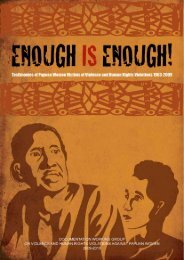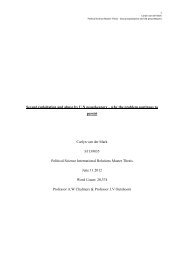The Impact of Armed Conflict on Women and Girls - UNFPA
The Impact of Armed Conflict on Women and Girls - UNFPA
The Impact of Armed Conflict on Women and Girls - UNFPA
You also want an ePaper? Increase the reach of your titles
YUMPU automatically turns print PDFs into web optimized ePapers that Google loves.
family planning, safe motherhood <strong>and</strong> emergency obstetrics, the preventi<strong>on</strong> <str<strong>on</strong>g>of</str<strong>on</strong>g><br />
<strong>and</strong> resp<strong>on</strong>se to gender-based violence, <strong>and</strong> the preventi<strong>on</strong> <strong>and</strong> treatment <str<strong>on</strong>g>of</str<strong>on</strong>g><br />
STIs, including HIV/AIDS.<br />
<strong>Women</strong> play key roles in ec<strong>on</strong>omic, social <strong>and</strong> family life, <strong>and</strong> are most<br />
affected by reproductive health problems. <strong>Women</strong> already have compromised<br />
health <strong>and</strong> social indicators, <strong>and</strong> the added stresses <strong>and</strong> experiences <str<strong>on</strong>g>of</str<strong>on</strong>g> forced<br />
migrati<strong>on</strong> can result in poorer health outcomes. <str<strong>on</strong>g>The</str<strong>on</strong>g>se stresses can include<br />
subjecti<strong>on</strong> to sexual violence, abuse, trauma, harassment, starvati<strong>on</strong>, poor water<br />
<strong>and</strong> shelter, chr<strong>on</strong>ic illness, loss <str<strong>on</strong>g>of</str<strong>on</strong>g> family <strong>and</strong> possessi<strong>on</strong>s, <strong>and</strong> death, am<strong>on</strong>g<br />
others. Investing in women’s reproductive health has positive effects <strong>on</strong> entire<br />
communities, as women are <str<strong>on</strong>g>of</str<strong>on</strong>g>ten the sole caretakers for extended families,<br />
including children <strong>and</strong> elders.<br />
Young people are persistently underserved within refugee populati<strong>on</strong>s,<br />
although they endure pr<str<strong>on</strong>g>of</str<strong>on</strong>g>ound losses at a crucial developmental stage. Young<br />
women are at special risk during forced migrati<strong>on</strong> from abducti<strong>on</strong>, forced<br />
recruitment into armed forces, sexual violence <strong>and</strong> abuse <strong>and</strong> increased risk <str<strong>on</strong>g>of</str<strong>on</strong>g><br />
STIs <strong>and</strong> HIV/AIDS. With strains <strong>on</strong> family systems, many must head<br />
households <strong>and</strong> care for family members. To ensure project successes for this<br />
dynamic group, adolescent involvement in planning <strong>and</strong> implementing<br />
rehabilitati<strong>on</strong> <strong>and</strong> rec<strong>on</strong>structi<strong>on</strong> programmes is essential.<br />
Male involvement is essential to improve women’s status <strong>and</strong><br />
empowerment, as well as to improve men’s health in its own right. Many men<br />
are interested in making positive changes towards women’s empowerment, <strong>and</strong><br />
more methods must be investigated <strong>and</strong> implemented to this end. Men <strong>and</strong> boys<br />
are vulnerable to sexual violence during c<strong>on</strong>flict, although little is known about its<br />
incidence. Unique challenges arise when c<strong>on</strong>sidering male involvement <strong>and</strong><br />
must be c<strong>on</strong>sidered for programme implementati<strong>on</strong> in c<strong>on</strong>flict settings. First,<br />
male integrati<strong>on</strong> can be difficult in c<strong>on</strong>flict situati<strong>on</strong>s due to the entrenchment <str<strong>on</strong>g>of</str<strong>on</strong>g><br />
traditi<strong>on</strong>al male values during displacement, especially when communities fear<br />
their cultural values will erode. Sec<strong>on</strong>d, the presence <strong>and</strong> impact <str<strong>on</strong>g>of</str<strong>on</strong>g> armed<br />
forces <strong>and</strong> military groups also negatively affect the reproductive health <str<strong>on</strong>g>of</str<strong>on</strong>g> both<br />
host <strong>and</strong> refugee communities. Both are complex issues that must be addressed<br />
with care.<br />
<str<strong>on</strong>g>C<strong>on</strong>flict</str<strong>on</strong>g> situati<strong>on</strong>s are never identical, since displacement length varies<br />
from short-term emergencies to l<strong>on</strong>g-term development settings. Refugees may<br />
live in large camps or be “integrated” into urban or rural settings. Reproductive<br />
health services must be flexible <strong>and</strong> adaptable to varied circumstances.<br />
Reproductive health in c<strong>on</strong>flict settings is highly politicized. Displaced<br />
communities can feel that they are targets <str<strong>on</strong>g>of</str<strong>on</strong>g> programmes for ethnic reas<strong>on</strong>s.<br />
Host populati<strong>on</strong>s can feel resentful <str<strong>on</strong>g>of</str<strong>on</strong>g> refugees who are seen as receiving better<br />
services than they are. In the internati<strong>on</strong>al community, some agencies <strong>and</strong><br />
8




![IANSA [PDF, 2MB] - PeaceWomen](https://img.yumpu.com/25206379/1/190x123/iansa-pdf-2mb-peacewomen.jpg?quality=85)
![Commitments Sample [PDF, 93KB] - PeaceWomen](https://img.yumpu.com/25206331/1/190x245/commitments-sample-pdf-93kb-peacewomen.jpg?quality=85)










![A Toolkit for Advocacy and Action [PDF, 260KB] - Peace Women](https://img.yumpu.com/25205989/1/190x245/a-toolkit-for-advocacy-and-action-pdf-260kb-peace-women.jpg?quality=85)